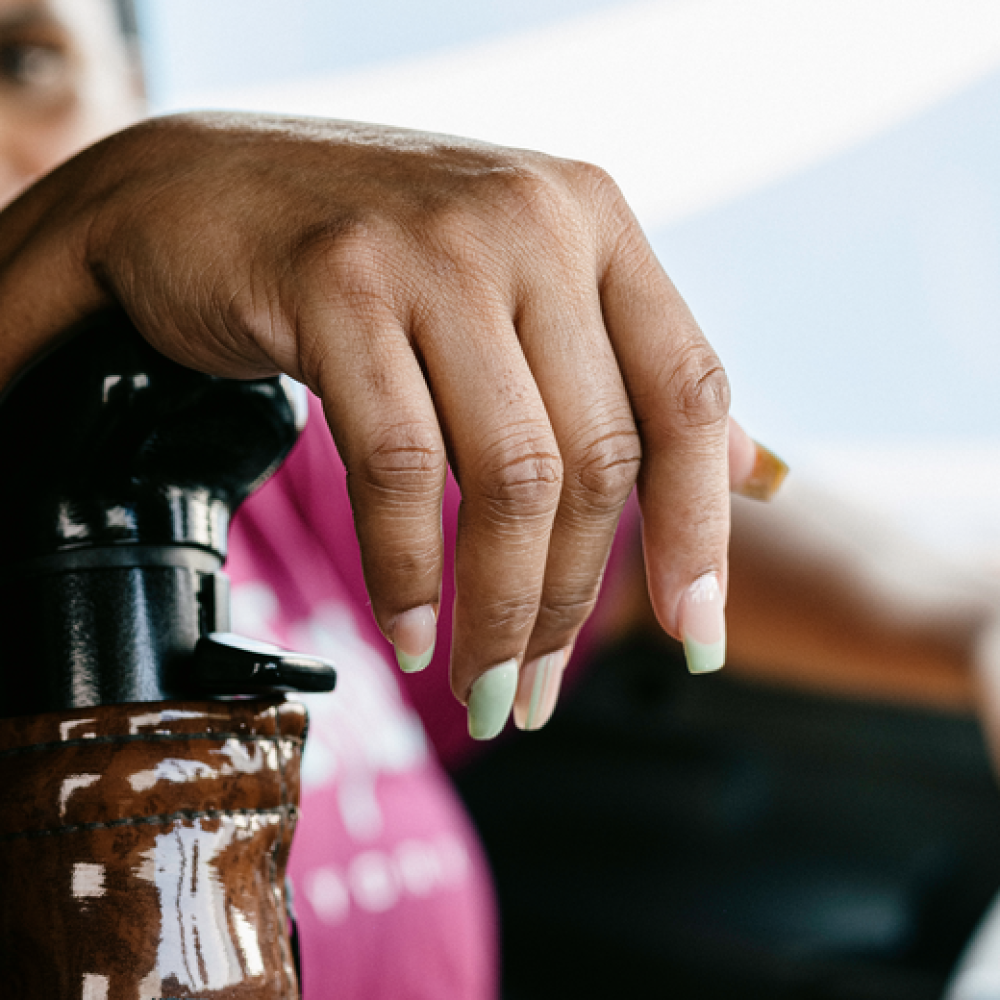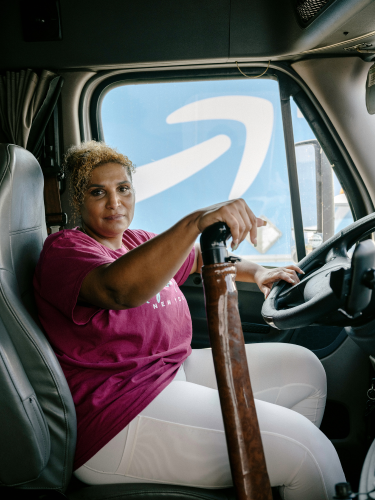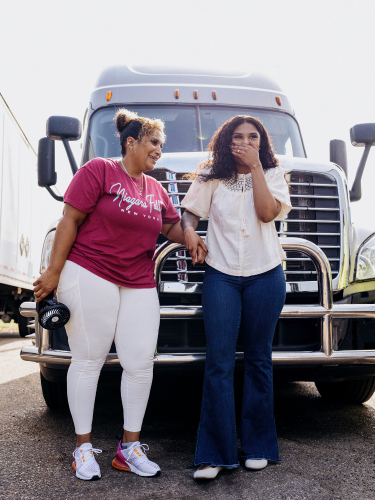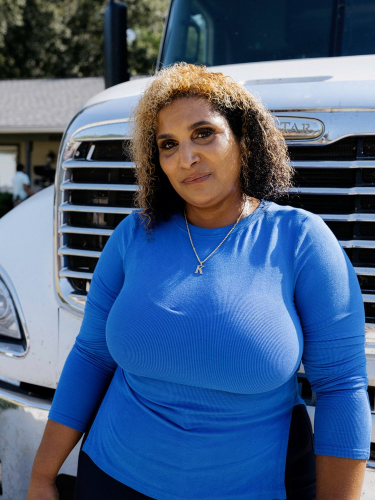The percentage of female truck drivers has risen to 12 percent nationwide. As Amazon Relay works to encourage the employment of women in our industry, we’ll continue to spotlight carriers that are going above and beyond for a more equitable future.
In celebration of Mother’s Day, we talk to Lakeisha Anderson and Mia McCray, owners of LLS Trucking. The mother-daughter duo discusses gender diversity in transportation and how Amazon Relay supports women in trucking.
Did you have any doubts about being a female trucker, pursuing a career in a male-dominated industry?
Lakeisha: I didn’t think, I just did it. And I didn’t know what I was getting into. I was working two full-time jobs and truck drivers would come in. I would sign their paperwork and I would ask them about it. And the newspapers would always say, ‘you could make money if you get a CDL, you have a job right after.’ And I just called on a Monday. And Wednesday they told me I was accepted. And I took off and was in Tennessee by Friday. I left my job, my car, my daughter with my sister. And I just did it. [laughs] Praying every day.
How soon did you notice discrimination against women truckers?
Lakeisha: I would say right off. At the school, it was probably 3 women, and I was the youngest. And the men’s questions were ‘Do you think you can drive that big truck?’ Like, do you think you can drive that big truck? [laughs] And, ‘Can I demonstrate it for you before you get in there?’ Like, no, I think I got it. And it still goes on today. Things like putting oil in your truck, or checking your oil, they don’t think you can do that. When I have to adjust my brake pads, they ask ‘What kind of tool do you use for that?’ I have a whole outfit up in there just to get underneath the truck. They think you don’t know anything mechanical, that you’re just driving it. When I tell you that they have men that drive these trucks that don’t know anything – I have to let them know what a problem is when they describe it to me. And they’re appalled that when they get it checked, it is what I say it is.
As a woman-owned trucking company, how does that influence your hiring strategy for female CDL drivers?
Mia: She wanted to be a predominantly woman trucking company. We’re very open to it still, we really want it in the future. When we come across the right people, they will of course be on the team.
Why has it been hard to find the right female truck drivers?
Lakeisha: It’s not just the women, it’s finding the right truckers, period. Trucking is not for everybody. [laughs]
Mia: They get on Youtube and TikTok and what do they see, Mom? Everybody is like, ‘It’s easy money, you’re just driving.’ No, it’s way more to it than that. It’s not as…I’m not gonna say ‘lenient’ as it was back in the days, but there are more laws which make it more difficult for people to become truck drivers. More rules are being added every year from FMSCA, just more regulations that have to be followed. I think it’s because the trucking field is-
Lakeisha: Overwhelmed!
Mia: And accidents are becoming way more common.
Where does that strength and entrepreneurial spirit come from? Did you have strong female role models?
Lakeisha: As far as my mom, she was a strong lady. But not in work ethic. I think looking at my mom and dad made me want more for my kids. And that made me determined to do better than where I came from. I didn’t want my kids to do or see what I went through. I never knew about trucking period. I never thought about it in a million years. Just to be in it and doing it well, must I say, and doing it better than most men.
Was Lakeisha’s success as a woman in trucking what drew you into the industry, Mia?
Mia: My mom sacrificed a lot of time into the industry and I admire that because there were things she had to miss out on, which I feel like most parents do. Especially men. She took that risk. And honestly, our dynamic in this whole company is very different. She is more of the risk taker, like, ‘I don’t want to sit there and think about it, I just want to do it.’ And I’m more of the, ‘Okay, Mom. We have to come up with a plan.’ It works out well for us. I’m the Negative Nancy. [laughs] I’m going to be her conscience. There’s a lot of things in this industry you become overwhelmed with. But she makes me more open and think ‘We cannot dwell on every loss that we take, we have to keep pushing. No matter what.’ So that is what made me really thrive in this industry, is her saying, ‘We gotta keep moving, because it doesn’t stop.’ Just like an 18-wheeler.
What stage was the business when you started, Mia?
Mia: [laughs] I was actually in the midst of leaving a bad relationship. And everything was brand new to me. Me coming into the field with her, me just taking a risk all-around. [laughs] It was a time that we were like, ‘Whatever goes, goes. We’re walking by faith, not by sight, at this point.’
Lakeisha: And she was in her early twenties and I think I was just paying her a minimum of $200 a week until we realized everything we had to do.
Mia: As we expanded, we had to grow. More wheels come, more things happen, we had to increase pay, you know. As the company pay increases, so did mine.
Generationally, would you say you experience the same level and type of gender bias in the trucking industry?
Mia: I mean, we’re in the south, and we’re black women, we’re in the trucking industry. They hide it well. Like when we go to get trucks repaired, they see my mom and think she’s younger than what she is and think she doesn’t have the experience that she has – which is 30 plus years – and they just automatically feel like they can pull the wool over her eyes. Something else that wasn’t wrong with the truck will become a problem a week or two later, so she has to find another mechanic. We feel like some of the mechanics like to mess with the trucks because they think we don’t know anything. They will try to take advantage of women price-wise.
Many female truck drivers also have safety top of mind on the road, whether it’s driving alone at night or finding well-lit rest stops. How has harassment or concern about it influenced your trucking experience?
Lakeisha: Forgive me, but men have this perception that women, when they ask for their help, I’m so sorry, but it happens all the time. Like, they hit on you. And if you don’t give them-
Mia: What they want.
Lakeisha: Right, what they want. And you don’t ‘act right,’ they don’t want to help you. And I don’t want women to think they have to stoop that way. You really have to be hard. Not all men are like that, but because my trucks are here, I have to find local mechanics and they play this song and dance to see where you’re going to go with it. And that is the hardest thing as a woman in this trucking industry. And I have been dealing with this for twenty-something years. Because I don’t look like a typical truck driver.
Mia: Right, you look like a little friendly bunny rabbit. And not to say this isn’t happening in every industry. But in the trucking field, it’s so bold.
Many women in truck driving report being passed over for heavy loads because of an assumption that they can’t lift. Did you see ownership as a way to circumvent the gender bias in booking jobs?
Lakeisha: Earlier on, I never did heavy loads. I did do flatbeds for a while, before my son was born. Matter of fact, I had been pregnant. But now I see a lot of women doing flatbeds. And I applaud them because that is hard work. But as far as getting picked for loads, I never inquired because that takes money, time, and you have to go through so many strings to get your overweight tickets.
Mia: It was too much of a hassle for you, Mom? [laughs]
With so many nights on the road, is the gender-biased expectation of work-life balance for a woman especially prevalent in the trucking industry?
Lakeisha: I raised my daughter and three of my nephews. And still today, it’s not like I have scheduled time. I think I did pretty good to have been a single mother.
Mia: You did excellent, Mom.
Lakeisha: I have learned that being a parent over the road, you have to teach your kids a certain way to be independent and responsible. And that means drilling them and being consistent with your roots. I taught my son to drive early just in case I wasn’t around. I didn’t ever believe in baby-fying. I had tough love.
Mia: I think it’s the 21st century, and everybody’s going outside the so-called “norm” of what’s supposed to be expected from women. Women are becoming the one to miss out on certain events, but at the end of the day, it builds character. As we get older, we realize sacrifices have to be made to get where we need to be in life. I don’t have anything against women who have to do what they have to do. Especially with one parent in the household.
Lakeisha: Thank you, daughter. [both laugh] Sometimes I was gone 2-3 days overnight. My twin sister was on standby. So, if you have that support system, then women in this industry, yes, we can make it as parents. Not only truck drivers can’t be there for their kids. Working parents period have to miss certain things. Remember I used to have all six of y’all in the truck at one time? My twin sister’s kids, my other sister’s kids, my kids. They were just in the sleeper, I’d close the curtains up, and tell them to be still when I had to go into a facility. I forgot about that, Mimi. [both laugh] That’s what I had to do as a single parent. I brought them with me when I could, especially in the summer time.
Mia: The risk taker. [both laugh]
Lakeisha: Where there’s a will, there’s a way. If you’re determined, you’re going to make a way.
Mia: So, let’s just put this out there. I’m a horrible driver. Growing up in the truck, I loved traveling state to state, eating all the snacks. But I will say I have a story – I haven’t gotten back in a truck since I went into labor and gave birth to my 11-year-old son. And she had to pull over on the highway in Houston, Texas. So, we live in Louisiana but he has a Texas birth certificate. Haven’t been in a truck since. I’m willing to learn, but she doesn’t want me anywhere near it. She’s like, ‘please just work on the paperwork and keep everything legal.’ [laughs] But, she’s basically grooming my brother to be a truck driver. This business was always about generational wealth and to keep going in the family.
Through Relay, you’ve attended multiple seminars, like the WBENC (Women’s Business Enterprise National Council) conference. Has support from Relay helped overcome any gender bias that was a barrier previously? What mentorships have you been able to create?
Lakeisha: RelayCon was very helpful. Just to see how many people in different states were interested in Relay and doing it well. Like getting their trucks through Amazon, because I didn’t do it that way. If I would have known about it, I think it probably would have been a good help. By meeting those people and other companies, it made me strive harder. They were giving me insight on what they do in their space. Like I really want to get my UIIA, but Louisiana insurance is just so hard right now. So, a guy I met there was telling me how he does well with the UIIA. Going there made me realize there’s more to Relay than I knew.
Mia: Well, for me, it was an eye-opening experience. I was thrilled with people actually listening to our take on this industry because we did a panel. And people came up to us and exchanged information. A lot of things really fell into place once we got there. I felt honored to be there as a guest. They made us feel very comfortable, and they actually listened and asked the right questions. And I admired that.
Become a part of our shared success
Our carriers’ insights go toward improving the Relay tech that already exists and building what doesn’t. Start your Relay application on desktop or our app on iOS or Android. But first, check out Relay’s carrier requirements to make sure hauling for Amazon is the right fit for your business.
Disclaimer: Amazon does not tender loads through any third-party load boards. Any Amazon loads posted on third-party load boards will only be tendered directly to approved and onboarded carriers via the Relay web portal or Relay mobile app. If you are interested in hauling loads for Amazon, sign up and book directly on relay.amazon.com. For more about our efforts against fraud and cargo theft, see our trustworthy transportation page.











